Fiction
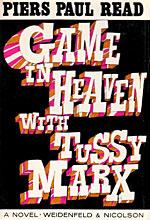
Game in Heaven with Tussy Marx. Weidenfeld & Nicolson, 1966
The youngest daughter of Karl Marx, Eleanor – nick-named Tussy – looks down from Heaven and discusses what she sees with the narrator and a duchess. Together they follow the fortunes of a young revolutionary, Hereward – his contests with the wily reactionary, George Watkinson; his marriage to a peer’s daughter, Miranda; his betrayal of Miranda and final redemption.
‘Marvellously comic, superbly inventive…Mr. Read’s is one of the most arresting novels to have appeared in recent years’.
The Times
‘Now here’s something to cheer about – a first novel which is outrageously funny and wickedly serious, and vibrates with talent on both planes’.
Anthony Hern, Evening Standard
‘Those who feel the English novel is getting technically slack should back Game in Heaven with Tussy Marx’.to top
Norman Shrapnel, Guardian
The Junkers. Secker & Warburg. An Alison Press Book. 1968.
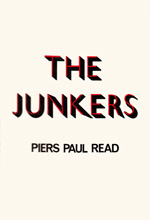 A young British diplomat serving in West Berlin falls in love with Suzi a German girl whom he first sees in a café on the Kurfürstendamm. She is the niece of a German politician who the narrator, in his role as the political adviser to the commander of the British garrison in the city, has been told to investigate because of his links with prominent Nazis in the past.
A young British diplomat serving in West Berlin falls in love with Suzi a German girl whom he first sees in a café on the Kurfürstendamm. She is the niece of a German politician who the narrator, in his role as the political adviser to the commander of the British garrison in the city, has been told to investigate because of his links with prominent Nazis in the past.
The narrative now divides between the narrator’s pursuit of the enigmatic Suzi in West Berlin in the early 1960s, and the back story of a family of Prussian aristocrats, the von Rummelsbergs – the Junkers of the novel’s title. There are three brothers – Klaus, Helmuth and Edward – who react in different ways to the prevailing ideologies of Communism and National Socialism. The reader, like the narrator, is obliged to live through Germany’s `undigested’ past.
Awarded the Sir Geoffrey Faber Prize.
‘Piers Paul Read tells a good story and writes with distinction… The Junkers is full of wit and coldly compelling realism… Mr. Read is one of the most promising writers of his generation.’
William Trevor, Guardian
‘This is dazzling writing and almost a panoramic view of history.’
Isabel Quigly, Financial Times
‘…head and shoulders above most contemporary fiction. He is obviously a major novelist in the making.’to top
Wilfred De’Ath, Illustrated London News
Monk Dawson. Secker & Warburg. The Alison Press Book. 1969
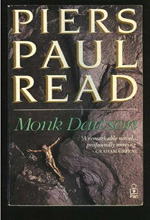 Edward Dawson is sent by his widowed mother to be educated at Kirkham, a Catholic boarding school run by Benedictine monks. Conscientious and idealistic, Dawson is persuaded that he has a monastic vocation and joins the community upon leaving school. He soon feels that educating the sons of the rich is an inadequate response to suffering and injustice and so leaves Kirkham to serve as a secular priest in London. Under the eye of an indulgent archbishop, Dawson’s radical sermons and provocative articles in the Catholic press gain him many admirers, but they also persuade him that the solutions to human suffering are to be found in social work, politics and perhaps psychology but not religion.
Edward Dawson is sent by his widowed mother to be educated at Kirkham, a Catholic boarding school run by Benedictine monks. Conscientious and idealistic, Dawson is persuaded that he has a monastic vocation and joins the community upon leaving school. He soon feels that educating the sons of the rich is an inadequate response to suffering and injustice and so leaves Kirkham to serve as a secular priest in London. Under the eye of an indulgent archbishop, Dawson’s radical sermons and provocative articles in the Catholic press gain him many admirers, but they also persuade him that the solutions to human suffering are to be found in social work, politics and perhaps psychology but not religion.
Dawson leaves the priesthood to work as a journalist. He is taken up by a rich divorcée, Jenny Stanten, and becomes her lover. He enters her circle of decadent, fashionable friends and follows a precipitous Rake’s Progress towards debauchery and disillusion.
Awarded the Hawthornden Prize and the Somerset Maugham Award
‘A remarkable novel. Witty, even cynical, observation leads to a conclusion profoundly moving’.
Graham Greene
‘Rare immaculately constructed work…so pleasurable you wish it would never end.’
Evening Standard
‘All dark velvet and dry ice… If you are caught up by it, as I was, you will devour it at a single sitting and savour its resonances.’to top
Christopher Lehmann-Haupt, New York Times
The Professor’s Daughter. Secker & Warburg. An Alison Press Book. 1971.
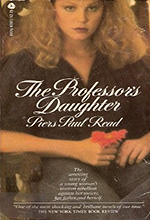 Louisa Rutledge, the nineteen-year-old daughter of a Harvard professor, picks up a stranger on Boston Common and, after a crude coupling in her apartment, throws herself out of her window. She survives and returns to the home of her parents in Cambridge, Mass. – her father a rich, east-coast patrician, descended from a signatory of the Declaration of Independence; her mother the alcoholic mistress of a powerful senator.
Louisa Rutledge, the nineteen-year-old daughter of a Harvard professor, picks up a stranger on Boston Common and, after a crude coupling in her apartment, throws herself out of her window. She survives and returns to the home of her parents in Cambridge, Mass. – her father a rich, east-coast patrician, descended from a signatory of the Declaration of Independence; her mother the alcoholic mistress of a powerful senator.
After this preamble, the novel tells the story of the Rutledge family – how Louisa’s parents were drawn into Democratic politics with Henry, her father, the political theorist of the party’s liberal wing. But Henry’s ideals are compromised by the corrupt wheeling-and-dealing of his wife’s lover, Senator Laughlin; and at the same time his progressive views are outflanked by the radicalism unleashed by opposition to the war in Vietnam. It is 1968 and, with no clear principles beyond her parents’ fashionable but now discredited liberalism, Louisa plunges into the political and sexual maelstrom of the times.
‘A passionate questioning of American society is welded to a drama of fanaticism, betrayal and doubt. Mr. Read has elegantly and with assurance expressed broad moral and political concerns through a novel.’
Financial Times
‘One of the most shocking and brilliant novels of our time.’
New York Times Book Review
‘Piers Paul Read is undoubtedly one of the most talented novelists of our generation.’to top
Francis King, Sunday Telegraph
The Upstart. Secker & Warburg. An Alison Press Book. 1973.
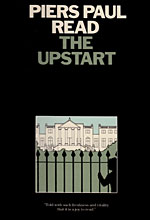 Hilary Fletcher is the son of the vicar of Lasterby, a village in North Yorkshire; his uncle, his mother’s brother, is a farmer, the tenant of Sir Edward Metherall who lives at Lasterby Hall. Hilary is taken up by the Metheralls as a playmate for their children, Mark and Harriet. He is captivated by the upper-class Metheralls, and aspires to become part of their world, but as he enters into adulthood he is rebuffed and a finally humiliated at a Hunt Ball.
Hilary Fletcher is the son of the vicar of Lasterby, a village in North Yorkshire; his uncle, his mother’s brother, is a farmer, the tenant of Sir Edward Metherall who lives at Lasterby Hall. Hilary is taken up by the Metheralls as a playmate for their children, Mark and Harriet. He is captivated by the upper-class Metheralls, and aspires to become part of their world, but as he enters into adulthood he is rebuffed and a finally humiliated at a Hunt Ball.
Hilary’s rejection by the Metheralls transforms him into a vengeful class warrior, intent on subverting society as a purveyor of vice. With a friend from his school days, an Iranian Quazvini, Hilary becomes a thief, a pimp, a gambler, a serial seducer; but also an artist whose work, initially meant to launder his profits from crime, becomes fashionable, and he encounters once again the friends of his childhood, Mark and Harriet Metherall – and their fourteen-old sister, Martha.
‘A thoroughly evil book reeking with decadence… Read seems to get frighteningly better with each book.’
The Sunday Times
‘Told with such freshness and vitality that it is a joy to read.’
Auberon Waugh, Evening Standard
‘Superb…damned engrossing and a pleasure to read.’to top
New York Times Book Review
Polonaise. Secker & Warburg. An Alison Press Book. 1976
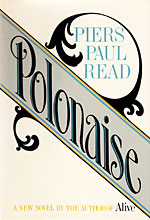 Jezow, the ancestral estate of the Kornowski family, is bankrupt. The old count has gone mad; his wife is an invalid, his son Stefan is still a school-boy. Krystina Kornowski, the count’s daughter, believes that the bank’s representative will postpone foreclosure if she sleeps with him. She is double-crossed. The estate is sold and the family are evicted from their family home.
Jezow, the ancestral estate of the Kornowski family, is bankrupt. The old count has gone mad; his wife is an invalid, his son Stefan is still a school-boy. Krystina Kornowski, the count’s daughter, believes that the bank’s representative will postpone foreclosure if she sleeps with him. She is double-crossed. The estate is sold and the family are evicted from their family home.
Stefan and Kyrstina move to live with an aunt in Warsaw. Radicalised by their sudden destitution, they join the Communist party and Krystina marries a party activist Bruno, by whom she has a son, Teofil. Stefan abandons his study of law and becomes a writer. His avante-garde work is a critical success. He leaves the party, is taken up by the rich Princess Czarniecki and given a room to write in in the Czarnieki palace. There Stefan plans the sadistic seduction of the Czarnieki’s daughter Tilly but, before his plan can be put into effect, he accepts the offer of a promotional free passage on a liner sailing to New York. As the boat reaches its destination, the passengers and crew hear the news that Germany has invaded Poland. All demand to return to Poland to fight in the war. Stefan disembarks and stays in America.
Almost twenty years later, Annabel Colte, the daughter of an English peer, goes to Paris to learn French. She is a paying guest in the flat of Krystina Kornowski, now Madame de Pincey. Annabel meets her landlady’s brother Stefan, recently returned from New York, and her son Teofil with whom she falls in love. The Kornovskis are invited to stay with Annabel’s parents in their large country house in North Cornwall where the innocent love of the young couple is threatened by a predatory roué.
‘A marvellous, absorbing book. You’ll be the richer for having read it.’
New York Times Book Review
‘An experience: it gradually draws you into its complex web, persuades you to identify with its leading characters and leaves you much wiser about a country and its people…a considerable achievement.’
Martin Goff, Daily Telegraph
‘If Dostoyevsky were reincarnated as an Englishman, he might write novels like Piers Paul Read’.to top
Time
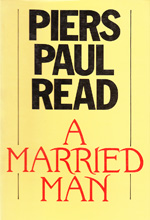
A Married Man. Secker & Warburg. An Alison Press Book. 1979
John Strickland is a middle-aged barrister with a wife, Clare, and two children. Staying with his parents-in-law at their house in Norfolk, he reads Leo Tolstoy’s novella, The Death of Ivan Illych, and this precipitates a mid-life crisis. What has happened to his youthful ideals to do good in the world? What has happened that has made his marriage go stale? It is the period of strikes, political crisis and the `three-day week’: Strickland determines to stand as a Labour MP. His ambition is mocked by his wife and, blaming her for his life’s stagnation, he starts an affair with another woman.
‘Compelling… A Married Man is a sharp chronicle of England in an uneasy time. It confirms that Piers Paul Read is one of Britain’s most intelligent and disturbing writers.’
Malcolm Bradbury, New York Times Book Review
‘A wonderfully observed study of ambition, money, politics and the legal profession, full of recognisable scandals and skulduggery.’
Paul Theroux, The Sunday Times
‘A story full of suspense and subtleties… Mr Read has outdone himself.’
New York Times
‘A superb novel…an intricate and wholly absorbing portrait of a man in middle-aged crisis.’
The Daily Telegraph
‘Excellent…totally honest, totally absorbing, and says many things which are worth saying.’
Auberon Waugh, The Standard
‘Eminently readable…a novel which is both subtle and powerful.’
John Braine, Sunday Telegraph
‘A Married Man, by Piers Paul Read, was published in 1980. I keep talking about this book, hoping that someone will reissue it; it is out of print. It’s a wonderful novel. It is elegantly plotted and about serious stuff. A lawyer in London who is turning 40 is engrossed with thoughts about the onset of middle age and the decline of Britain. He is drawn into an affair, with calamitous results. Obviously, some of the themes resemble those in my own books, which is probably what enhances my appreciation for it. The book was adapted as a TV movie, also quite good and equally disremembered.’to top
Scott Turow, Boston Globe and Mail, May. 18, 2012
The Villa Golitsyn. Secker & Warburg. An Alison Press Book. 1981
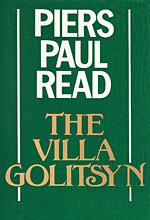 Simon Milson, a divorced diplomat, is asked to undertake an unusual and delicate mission in the South of France. Fifteen years before, a unit of the Ghurkhas, fighting Indonesian guerrillas in the jungles of Borneo, had been ambushed and killed. It was possible that their position had been betrayed by one of two junior diplomats serving in the British Embassy in Jakarta – Leslie Baldwin or Willy Ludley. Nothing could be proved against either but suspicion fell on Ludley when he suddenly resigned from the Foreign Office and went to live abroad.
Simon Milson, a divorced diplomat, is asked to undertake an unusual and delicate mission in the South of France. Fifteen years before, a unit of the Ghurkhas, fighting Indonesian guerrillas in the jungles of Borneo, had been ambushed and killed. It was possible that their position had been betrayed by one of two junior diplomats serving in the British Embassy in Jakarta – Leslie Baldwin or Willy Ludley. Nothing could be proved against either but suspicion fell on Ludley when he suddenly resigned from the Foreign Office and went to live abroad.
Now the second suspect, Baldwin, is up for a sensitive post in the Embassy in Washington and it becomes imperative to make certain that Ludley really was the traitor. Milson, a friend of Ludley from his school days, is to ask himself to stay with Ludley who is now living with his wife on the Cote d’Azur and try and extract a confession.
Milson arrives at the Ludleys’ house in Nice, the Villa Golitsyn, with Helen, a runaway sixteen-year-old school-girl whom he has met on the train. Rich, charismatic, Ludley is now an alcoholic – possibly to drown the remorse he feels over his treason – but is sustained by his admirable and attractive wife Priss and another old school-friend, Charlie. Charlie is gay and is still drawn to Willy who had seduced him at school; but Willy falls for the teen-age Helen and Simon for Willy’s wife Priss. Caught in sexual and emotional-cross-currents, Simon does his best not to lose sight of his mission.
‘Exhilarating, powerfully observed and provocatively written.’
The Times
‘A gripping story of treachery that holds the attention to the very end.’
The Sunday Times
‘The Villa Golitsyn keeps exploding… Like Graham Greene, Read mixes espionage and religion, dishonesty and faith.’
Time
‘Substantial and vivid. The sexual intrigue reaches a high pitch. Read is able to lead us by the nose on a merry chase.’to top
The New York Times
The Free Frenchman. Secker & Warburg. An Alison Press Book. 1986
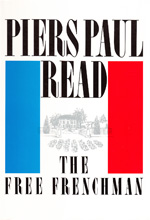 A young high-flying French civil servant, Bertrand de Roujay, from a conservative family in Provence, marries Madeleine Bonnet, the daughter of a free-thinking academic. The mothers of the young couple had been childhood friends, but the differences in outlook of the children are exacerbated by the political polarisation that has come over France at the time. We are in the 1930s with Communists and fascists fighting in the streets. The marriage does not last and France goes to war. Bertrand, now a Prefect, is refused permission to join the army; but after France’s defeat and the armistice with the Germans, he decides that he cannot serve under Marshal Petain. He escapes over the Pyrenees and eventually reaches London where he places himself at the disposal of General de Gaulle.
A young high-flying French civil servant, Bertrand de Roujay, from a conservative family in Provence, marries Madeleine Bonnet, the daughter of a free-thinking academic. The mothers of the young couple had been childhood friends, but the differences in outlook of the children are exacerbated by the political polarisation that has come over France at the time. We are in the 1930s with Communists and fascists fighting in the streets. The marriage does not last and France goes to war. Bertrand, now a Prefect, is refused permission to join the army; but after France’s defeat and the armistice with the Germans, he decides that he cannot serve under Marshal Petain. He escapes over the Pyrenees and eventually reaches London where he places himself at the disposal of General de Gaulle.
Bertrand’s life in France has introduced the reader to spies, priests, academics, criminals, politicians, prostitutes, policemen and refugees from the Spanish Civil War. In London, he becomes involved with the English and, when sent back to France by de Gaulle, with the different factions in the French Resistance. Bertrand becomes enmeshed in political infighting and mired in moral paradox as the story proceeds to a dramatic denouement.
Awarded the Enid McLeod Literary Prize by the Franco-British Society
‘A marvellous novel of great scope and understanding.’
Anita Brookner, The Spectator
‘Read has produced the intelligent person’s blockbuster.’
The Times Literary Supplement
‘People, ideas and issues jostle the pages as the narrative unfolds at a vigorous, race pace. Read weaves a tale of moral complexity and richness.’
The Sunday Times
‘An ambitious and audacious novel…a sweeping and gripping narrative… Read is almost alone among our novelists in being bold enough to work on this scale.’
The Scotsman
‘A vivid and vigorous story…. It is an absorbing depiction, rich in its old-fashioned attention to human behaviour.’to top
The New Yorker
A Season in the West. Secker & Warburg. An Alison Press Book. 1988
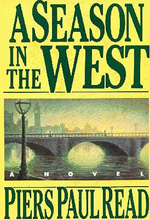 Josef Birek, a young dissident writer, escapes from Communist Czechoslovakia to the West. Birek already has a reputation: his work, smuggled into England, has been published by the Comenius Foundation in London, translated Laura Morton, the wife of a banker, who had studied Czech at Oxford University. When Birek comes to London, Laura helps him find his feet, introduces him into her circle of fashionable friends and he becomes her lover. At first Birek is lionised but soon discovers that there is a down-side to life in the free world.
Josef Birek, a young dissident writer, escapes from Communist Czechoslovakia to the West. Birek already has a reputation: his work, smuggled into England, has been published by the Comenius Foundation in London, translated Laura Morton, the wife of a banker, who had studied Czech at Oxford University. When Birek comes to London, Laura helps him find his feet, introduces him into her circle of fashionable friends and he becomes her lover. At first Birek is lionised but soon discovers that there is a down-side to life in the free world.
Awarded the James Tait Black Memorial Prize
‘A Married Man (1980) and A Season in the West (1988) must stand as two of the very best novels of the past decade… He is a profoundly serious contemporary writer whose merits, in an age of instant reputations and mass critical rallying around dubious flags, are consistently underrated’.
D.J. Taylor, The Spectator
‘A Season in the West grows in strength with every page; it is beautifully and minutely observed, by turns waspishly funny and unspeakably sad; and it offends all our prejudices. Who could ask for anything more?’
Stuart Reid, The Sunday Telegraph
‘This is a subtle satire on many false and hypocritical predilections. Like anything else by its author it is exquisitely readable and civilised… The story is sustained by so much elegant and concise irony that it would be a shame to give it away…’
The Financial Times
‘An entertaining and engaging read about the foibles of contemporary London society.’to top
The Washington Post Book World
On the Third Day. Secker & Warburg. 1990
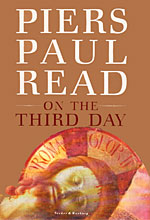 A distinguished archaeologist, Fr. John Lambert, a member of the Simonite order, returns to London from a visit to a fellow archaeologist in Israel and hangs himself in his cell. His body is cut down by his assistant and pupil, a younger friar, Andrew Nash. Andrew determines to discover the reason for his mentor’s suicide, and goes to Israel to talk to Fr. John’s Israeli colleague, Professor Dagan. There he learns that Dagan has made a discovery that casts doubt on the core belief of the Christian religion – the bodily Resurrection of Jesus Christ.
A distinguished archaeologist, Fr. John Lambert, a member of the Simonite order, returns to London from a visit to a fellow archaeologist in Israel and hangs himself in his cell. His body is cut down by his assistant and pupil, a younger friar, Andrew Nash. Andrew determines to discover the reason for his mentor’s suicide, and goes to Israel to talk to Fr. John’s Israeli colleague, Professor Dagan. There he learns that Dagan has made a discovery that casts doubt on the core belief of the Christian religion – the bodily Resurrection of Jesus Christ.
Dagan’s daughter, Anna, had been studying with Andrew under Fr. Lambert and dating Andrew’s brother Henry, a cynical womaniser with no belief in God. Anna, too, has a brother – Jake – a zealous Zionist serving in an elite unit of the Israel Defence Force. As Andrew, with Anna’s assistance, comes to realise that possibly Fr. John’s death was not suicide, it also becomes clear that his own life is in danger.
‘Essential reading… There is a moment of suspense so acute that your reviewer had to put the book down and walk around the room before she could turn the page.’
The Times
‘Chills the blood and makes the hair stand on end… Gripping and intelligent…confirming Read as one of our strongest novelists.’
The Independent
‘Beautifully written …the plot unfolds without a wasted word.’
Ruth Rendell, Daily Telegraph
‘Rewarding and exciting… Here the novel as elevated thriller reaches its peak.’The Guardian
‘Has the mastery of a well-constructed detective story…fascinates, entertains and informs…exciting, fast-paced, shrewdly amusing.’to top
The Literary Review
A Patriot in Berlin. Weidenfeld & Nicolson. 1995
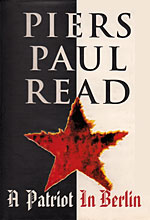 In the summer 1991, a Russian couple who deal in icons are found murdered in a villa in Berlin. There is evidence that the woman has been tortured before being killed. In Moscow, an officer in the new security service of the Russian Federation is despatched to German to find a rogue agent of the former KGB who has disappeared. Back in Berlin, an American art historian, Francesca McDermott, flies in to curate a major retrospective exhibition of Russian avant-garde art. The exhibition is the brain-child of Berlin’s new minister of culture, Stefan Diederich, a former dissident whom Francesca had known before the fall of the Berlin Wall. Stefan tells her that the price for Russian co-operation in mounting the exhibition is that she work with a Russian art historian, Andrei Serotkin.
In the summer 1991, a Russian couple who deal in icons are found murdered in a villa in Berlin. There is evidence that the woman has been tortured before being killed. In Moscow, an officer in the new security service of the Russian Federation is despatched to German to find a rogue agent of the former KGB who has disappeared. Back in Berlin, an American art historian, Francesca McDermott, flies in to curate a major retrospective exhibition of Russian avant-garde art. The exhibition is the brain-child of Berlin’s new minister of culture, Stefan Diederich, a former dissident whom Francesca had known before the fall of the Berlin Wall. Stefan tells her that the price for Russian co-operation in mounting the exhibition is that she work with a Russian art historian, Andrei Serotkin.
Serotkin turns out to have all the qualities of which the liberal-minded, feminist Francesca disapproves – he is a chain-smoking male chauvinist – but after he saves her from rape in Berlin’s Tiergarten she feels an involuntary attraction. He is also mysterious and has some kind of hold over Stefan Diederich. It is a time when Russia is in chaos, its assets plundered by cronies of Boris Yeltsin, and Berlin jittery because of the revelations that are emerging from the Stasi files.
‘Read has produced not just an engrossing and plausible thriller, but also a thoughtful and elegantly written novel – perhaps his best yet. A Patriot in Berlin is an extremely fine novel, and it is a great relief to know that there are still such accomplished storytellers in our midst.’
Philip Kerr, The Sunday Times
‘There’s more skill here, and more intelligence, than in any number of contemporary novels and the attempt to bridge the gap between `serious` literature and mass-market fiction is a laudable one.’
Robert Harris, Daily Mail
‘A novel which is at once a superbly crafted, seamlessly written entertainment but also a catechism of questions, some of which sharpen our focus on its theme of love caught up in betrayal…[an] intelligent, slipstreamed foray towards the midnight chimes of intrigue.’
Tom Adair, The Independent
‘Almost everything about this thoughtful and subtle novel is gripping.’
Mark Lawson, The Guardian
Knights of the Cross. Weidenfeld & Nicolson. 1997
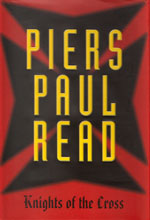 Michael Latham, once a leading expert on Soviet affairs, finds himself becalmed at the age of thirty-seven transcribing Russian language broadcasts at the BBC’s monitoring service in Caversham. His wife has left him; he is having an affair with a colleague whom he despises; he visits a therapist twice a week. He broods on the worldly success of two friends from his days at Cambridge – Gordon Taylor, the editor of the Sunday Gazette and George Harding, a junior minister in the Ministry of Defence. Both men would like Britain to leave the European Union.
Michael Latham, once a leading expert on Soviet affairs, finds himself becalmed at the age of thirty-seven transcribing Russian language broadcasts at the BBC’s monitoring service in Caversham. His wife has left him; he is having an affair with a colleague whom he despises; he visits a therapist twice a week. He broods on the worldly success of two friends from his days at Cambridge – Gordon Taylor, the editor of the Sunday Gazette and George Harding, a junior minister in the Ministry of Defence. Both men would like Britain to leave the European Union.
Then Harding’s body is found floating in the River Saar with marks that suggest some sadomasochistic orgy. Taylor, the Eurosceptic editor, suspects that he may have been murdered by a secret freemasonry of fanatic Europhiles – the aristocratic Catholic Knights of the Cross. The Knights run a charity that assists Catholics from the former Soviet Union, and Taylor asks Latham to infiltrate the organisation posing as a priest from a remote parish in Siberia. Bored with his life at Caversham, and attracted by a substantial fee, Latham accepts the offer. At Schloss Zelden, he meets the son and two very different daughters of his host, the Grand Master of the Knights of the Cross. He falls in love with the younger daughter, Monika, and discovers the truth about Harding’s death from her sister Babi who was Harding’s lover. However, imperceptibly Lambert is affected by playing the role of a priest. He returns to London a changed man.
‘Story-telling in the so-called serious novel is said to be a dying art these days; it is triumphantly alive and kicking in this novel.’
Spectator
‘Extremely well written, this is a subtle, highly intelligent novel, enlivened with a dry, sardonic humour.’
Evening Standard
‘Exceedingly clever new thriller…audacious and fast-moving.’Literary Review
‘An intelligent, compelling Eurothriller.’
Time Out
‘Its intelligence is undoubted and its characterisation magnificent. This is a superior work of fiction at every level.’
Sunday Telegraph
‘A man who at the very least has written three or four of the most distinctive and sharply written English novels of the whole post-war period… an account of spiritual awakening that reads like the paciest of spy thrillers.’
Mail on Sunday
‘Read…forces us to think and to feel. He is a very considerable novelist, far better and far more serious than many who receive fashionable attention. This book leaves most novels published this year floundering in its wake. It is serious, uncomfortable, but also continuously entertaining. What more can you ask for?’to top
Scotsman
Alice in Exile. Weidenfeld & Nicolson. 2001
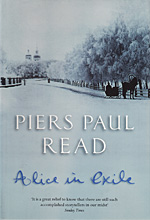 In the summer of 1913, a young army officer, Edward Cobb, recently returned from a tour of duty in South Africa, is invited to a party in Chelsea. Cobb, the son of a landowner, finds himself among actors, artists, writers and young women who drink gin and smoke cigarettes. He is attracted to one of these young women, Alice Fry, and escorts her back to her home on Markham Square. The two fall in love. Alice, raised by her free-thinking parents with a contempt for bourgeois conventions, and confident that she and Edward will marry, sleeps with him. Edward leaves the army to become a politician. A scandal involving Alice’s father persuades him that marrying her would scupper his career. He drops her not knowing that she is pregnant. In desperation, Alice accepts the offer of a Baltic baron whom she meets at Epsom to return with him to Russia as a tutor for his children.
In the summer of 1913, a young army officer, Edward Cobb, recently returned from a tour of duty in South Africa, is invited to a party in Chelsea. Cobb, the son of a landowner, finds himself among actors, artists, writers and young women who drink gin and smoke cigarettes. He is attracted to one of these young women, Alice Fry, and escorts her back to her home on Markham Square. The two fall in love. Alice, raised by her free-thinking parents with a contempt for bourgeois conventions, and confident that she and Edward will marry, sleeps with him. Edward leaves the army to become a politician. A scandal involving Alice’s father persuades him that marrying her would scupper his career. He drops her not knowing that she is pregnant. In desperation, Alice accepts the offer of a Baltic baron whom she meets at Epsom to return with him to Russia as a tutor for his children.
Baron von Rettenberg is a connoisseur of women but when he realises that Alice is pregnant he abandons his plans to seduce her and presents her to his wife and mother as a widow who is bearing her deceased husband’s child. The relationship between the liberated Alice and the reactionary Rettenberg develops first into one of respect, friendship, then love and finally, as Russia is overwhelmed by war and revolution, a dependency in which their roles are reversed.
‘…an enthralling journey…a slim line Dr. Zhivago… his account of the Russian Revolution has a haunting vividness which few authors could ever hope to match.’
Anthony Gardner, Mail on Sunday
‘Piers Paul Read combines consummate storytelling with a readiness to confront fundamental issues such as good and evil… he has never written more colourfully or more convincingly.’
Philip Ziegler, Daily Telegraph
‘Read feels no need to manipulate his characters into consistency; instead, like most of us, they thrive on puzzling self-contradictions, and bare their natures through moments of irrational impulsiveness.’
Helen Dunmore, The Times
‘I confess to having missed a highly advertised fiesta in a Mexican mountain town just so I could stay in the hotel and find out what happened, from 1913 to 1920, to Alice Fry, her ninny upper-class English lover, Edward Cobb, and her aristocratic Russian protector, Pavel Rettenberg, who ends up being the love of her life.’to top
Caroline See, Washington Post.
The Death of a Pope. Ignatius Press, San Francisco. 2009
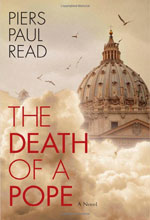 A young British journalist, Kate Ramsey, follows the trial at London’s Old Bailey of three men charged with conspiring to perpetrate a terrorist atrocity on behalf of the Basque separatists, ETA. The leading defendant, a Basque charity worker, Juan Uriarte, persuades the jury that the Sarin gas he sought to obtain was to deter the Janjaweed in Darfur. After his acquittal, Kate goes to Rome to interview the charismatic Uriarte, and there accepts his invitation to accompany him on a tour of refugee camps in Africa.
A young British journalist, Kate Ramsey, follows the trial at London’s Old Bailey of three men charged with conspiring to perpetrate a terrorist atrocity on behalf of the Basque separatists, ETA. The leading defendant, a Basque charity worker, Juan Uriarte, persuades the jury that the Sarin gas he sought to obtain was to deter the Janjaweed in Darfur. After his acquittal, Kate goes to Rome to interview the charismatic Uriarte, and there accepts his invitation to accompany him on a tour of refugee camps in Africa.
Back in London, David Kotovski, the researcher from Britain’s MI5 who gathered the evidence against Uriarte, remains convinced that the jury’s verdict on Uriarte was unsound. His further investigations parallel Kate’s growing emotional involvement with Uriarte. In Rome, a curial cardinal, Cardinal Doornik, awaits the death of Pope John Paul II. He himself is `papabile’ – a possible candidate for the papacy. His liberal views contrast with the traditionalism of Kate Ramsey’s uncle, a Catholic priest, Fr. Luke, and the radicalism of Juan Uriarte. The priest and the cardinal had known each other as seminarians and share a secret which Fr. Luke has inadvertently divulged to Kate and Kate to Uriarte. All the strands come together as the cardinals of the Catholic church assemble in Rome to elect a new pope.
‘If there were any justice in the world of letters, Piers Paul Read would be spoken of with Amis, Barnes, Rushdie and the rest of the dominant literary class wherever the great contemporary British novelists were mentioned… Read is impressive but in some ways jarring in that he's prepared to give some of the best lines to the bad guys…though the author has a taut and trusted morality, he's too sophisticated to make his characters mere conduits for right and wrong. There is complexity here, confusion, a sing-song of lyrical paradox and good intentions leading to colossally evil acts. It's impossible, by the end of the book, to feel smugly satisfied that all is well with the world that Read has just shown us, and I suspect that is precisely what the man wants us to experience.’
Michael Coren, The Afterword, July 11, 2009.
‘The plot's suspense made this book a page-turner, a delightfully fun Read. I could not put this one down’to top
J.C. Sanders, The Texas Inkling
The Misogynist. Bloomsbury. London, 2010
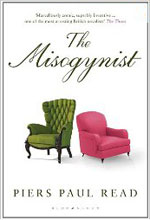 Geoffrey Jomier is a retired barrister living alone in London. His children are grown-up and he was divorced many years before – something he still broods on because it obliged him to sell his house in the fashionable Holland Park and move to the small dwelling of a Victorian artisan on `the wrong side of Shepherds Bush’. His former wife who married her lover, a rich City financier, lives in a large house in Kensington; his son, also in the City, is mildly embarrassed by his father; his daughter lives ten thousand miles away in Argentina.
Geoffrey Jomier is a retired barrister living alone in London. His children are grown-up and he was divorced many years before – something he still broods on because it obliged him to sell his house in the fashionable Holland Park and move to the small dwelling of a Victorian artisan on `the wrong side of Shepherds Bush’. His former wife who married her lover, a rich City financier, lives in a large house in Kensington; his son, also in the City, is mildly embarrassed by his father; his daughter lives ten thousand miles away in Argentina.
Jomier is in demand as a single man, and his gloom lifts when he meets a fellow divorcée, Judith, whom he had fancied as a young man. Can they start over together? Or will the baggage from past hold them down? Their sexagenarian love affair is put to the test when Jomier’s daughter falls ill.
‘At once eloquent and entertaining, intelligent and incisive…Novels don’t come much more diverting or sublimely satirical than this.’
Sebastian Shakespeare, Tatler
‘Read has a plot-twist up his sleeve, as cunning a concoction of sex, medicine and religion as you could wish for. It is a delicious finale to an absorbing book.’
Sunday Telegraph
‘Sharply written, mournfully acute on the horrors of twentieth-century London… Brooding, candid and unsparing.’
Spectator
‘This is a novel that grows stronger and stronger as it develops its portrait of a lost soul trying hard to find peace and purpose… Impressive.’
Daily Mail
‘It’s a novel that seems at first plain to the point of being mousy but is actually subtle and alive at every point. It has, too, an unexpected compassion and something akin to wisdom that gradually hits the reader, like the belated recognition that you have been on some road to Damascus, though it’s hard to place the moment when you fell of the horse and how you came to see that Read was one of the better writers alive. I have not read a finer work of contemporary fiction in the past year. It’s a long time since I have been so surprised by a novelist’s ability to represent the tears and laughter of all-too-familiar things.’to top
Peter Craven, The Age (Australia)
Scarpia. Bloomsbury, 2015
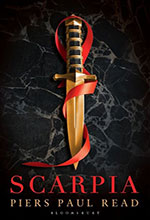 It is the late eighteenth century, and a young Sicilian nobleman, Vitellio Scarpia, finds himself penniless and in disgrace on the streets of Rome. After leaving home to pursue a military career, his impulsive and undisciplined nature has led to his expulsion from the Spanish royal guard, and he must now seek his fortune in Italy; a fortune inseparably bound up with the ruler of the Eternal City, the Pope.
It is the late eighteenth century, and a young Sicilian nobleman, Vitellio Scarpia, finds himself penniless and in disgrace on the streets of Rome. After leaving home to pursue a military career, his impulsive and undisciplined nature has led to his expulsion from the Spanish royal guard, and he must now seek his fortune in Italy; a fortune inseparably bound up with the ruler of the Eternal City, the Pope.
Scarpia enrols in the Papal army and becomes the lover of an alluring countess who introduces him to Roman society with its blend of religiosity, sophistication and intrigue. Half-enthralled, half-appalled, Scarpia enters the life of the decadent city, learning in due course that as an unsophisticated provincial he is no match for the worldliness of Rome.
Meanwhile, in the Veneto, Floria Tosca, a fifteen-year-old peasant with an exquisite voice, is fought over by a prioress, a bishop and finally a powerful prince who takes her to his palace in Milan and launches her at La Scala. She is a sensation, and becomes famous overnight. In Venice, after performing at La Fenice, she meets Scarpia, on a mission to Venice to assess the military potential of the Serene Republic; for, following the revolution in France in 1789, Italy is in turmoil with Italian revolutionaries plotting to bring down the despotic rulers, and the French preparing to invade the peninsula.
In the dramatic years that follow, the lives of Scarpia and Tosca intertwine, ending in a tragic denouement in Rome at the turn of the century
Piers Paul Read is one of England’s most accomplished novelists, and Scarpia is among his finest novels.
Allan Massie, Wall Street Journal
`Read’s always laconic style has…reached a whole new level: cool, detached, plumbing well-nigh fathomless depths of irony while never quite disguising the layers of feeling that lie beneath…. Scarpia is, like everything else he has written over the past 49 years, a pleasure to read.
D.J. Taylor, The Guardian
`Always a dab hand at clever historical fiction, Read has chosen the villain in Puccini’s Tosca…as the hero of this wonderful novel.’
Kate Saunders, Saga
`You don’t need to know the opera Tosca to understand and enjoy this book about Puccini’s most notorious villain, Vitellio Scarpia.
Andrew Barrow, The Spectator
`If you’re expecting the novelization of the opera, Scarpia is something different - and much, much more.
Opera
to top`Born in England in 1941, Piers Paul Read is one of the great writers of our time. His new novel Scarpia is a painstakingly accurate historical reconstruction of events in the late -18th century Italy that formed the basis for the story Puccini put into drama and music in his opera Tosca; but it is also an attempt, at once imaginative and historical, to convey possible dimensions of historical meaning and mora significance not found in the opera.
M.D. Aeschliman, National Review Online